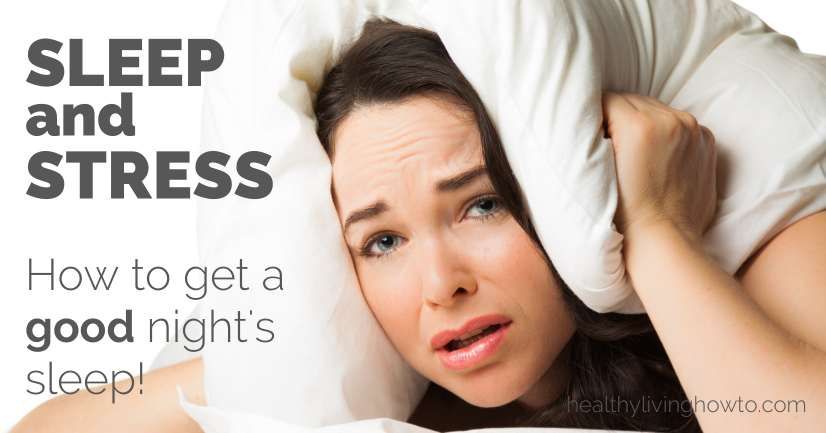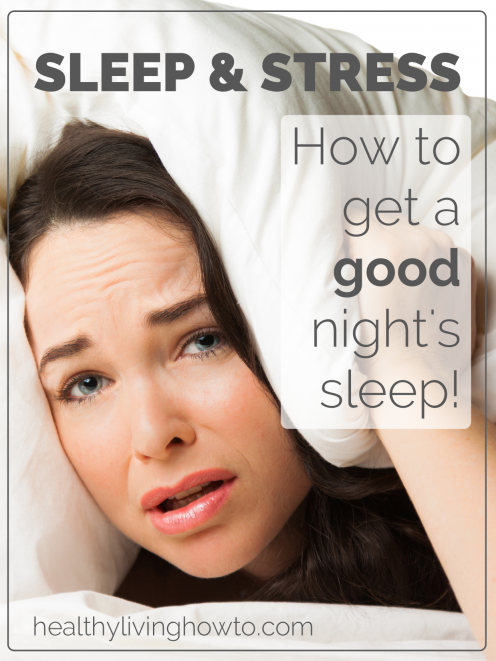When it comes to living a healthy lifestyle, sleep has to be right up there at the top of healthy habits to implement. If you aren't getting adequate, consistent sleep, you are essentially altering your cells in favor of aging and disease. Sleep is not a luxury, but a necessity for good health.
Sleep and Stress: Why You're Not Sawing Logs
When the body is under stress, cortisol, epinephrine and norepinephrine are produced by the adrenal glands. We need proper amounts of these hormones for a healthy stress response. It is when stress is excessive that these hormones have a negative impact on our health. Chronically elevated levels of these hormones create a cascade of health problems including insomnia.
Adrenal Fatigue, Sleep and Me
When I was healing from adrenal fatigue, the first order of business was to regulate my cortisol output and restore my sleep. My sleep issues were due to elevated nighttime cortisol, I was tired and wired. I could fall asleep, but didn't stay asleep. I just thought it was normal to be a “light” sleeper and toss and turn all night. I might have been in bed for 8 hours, but I certainly wasn't sleeping for 8 hours.
Sleep medication (along with an SSRI antidepressant), which was suggested to me when I went to a conventional doctor, may have helped me sleep, however, it would not have gotten to the root of my sleep problems…high nighttime cortisol. If I had chosen to go the route of prescription sleep meds, I have no doubt, I would still be taking them today.
Chronic Sleep and Stress, The Catch-22
Lots of things can cause random sleepless nights, however, I would argue, for most insomniacs (like I was), or those who consistently have problems with falling asleep and staying asleep, it is a direct result of chronic stress and our modern fast-paced, high-tech, lifestyles.
It's a catch-22, really, as chronic stress results in the body producing cortisol which interferes with our ability to both fall asleep and stay asleep. When we lose sleep, more stress hormones are produced. And therein lies the cycle.
So what's a person to do?
Stress. How is it Affecting You?
For starters, if you want to get healing, restorative, consistent sleep, the key is to work on calming down your brain throughout the day. This means first, becoming aware of the psychological, physical, nutritional and environmental stressors you encounter, recognizing how you respond to these stressors and then doing something about it.
Here is a simple quiz, created by metabolic medicine expert, (and my doctor) Jim LaValle, RPh, ND, CCN, to help identify the early stages of excessive stress:
For each statement, simply answer yes or no.
- I have food cravings for sweets or starches, especially in the afternoon or evening.
- I have food cravings for salty snacks.
- I have trouble concentrating on my work during the day.
- I have short-term memory loss.
- I am experiencing a reduced sex drive.
- I am feeling increasingly irritable and becoming shorter tempered with co-workers and family members.
- I feel increasingly anxious and worried.
- My waistline is getting bigger.
- I don’t laugh as much as I did, or don’t seem to have my same sense of humor.
- I have a noticeable drop in my energy at midday.
- I need to use caffeine to stay energized throughout the day.
- I have trouble falling asleep at night because I can’t stop the constant thoughts in my mind.
- I fall asleep, but wake up throughout the night and have trouble getting back to sleep
- I wake up and raid the refrigerator at night.
- My food doesn’t seem to be digesting well.
- I catch colds and flu easily.
- I notice my heart racing or beating irregularly.
- I am always rushing from one event to another.
- I feel over committed, or find it hard to meet my commitments.
- I have a strong drive followed by exhaustion.
If you answered yes to any of these questions, stress is affecting you. If you answered yes to many of them, consider it a wake-up call.
![Stress & Sleep. How To Get A Good Night's Sleep | healthylivinghowto.com Stress & Sleep. How To Get A Good Night's Sleep | healthylivinghowto.com]() Cool The Cortisol Flame
Cool The Cortisol Flame
If stress and elevated stress hormones are contributing to your lack of sleep, then the first order of business is to cool the cortisol flame. I am not going to go into details here, as I have an entire post, titled, Help! What To Do About High Cortisol Levels, written by my friend, Jaime Martinez, RD, LD, dedicated to this. In it, she outlines the nutrition, exercise and lifestyle recommendations that can help you lower your cortisol to optimal levels.
What Supplements Can I Take?
Now, the question I seem to always get, when it comes to restoring sleep…”what supplements can I take?”
So, here's the deal, while I am a fan of supplements, and they were an integral part of resolving my cortisol and sleep issues, they were not the solution, but adjunct therapy.
The way I see it, stress management, establishing healthy sleep habits/routine and supplements work together. The end goal being able to sleep 8-9 hours at night, consistently, without the need of supplements. Keep this in mind before popping pills.
I also recommend working with a professional, who is trained in supplement use, who can address your health in a holistic manner.
Relora (click here) helps to relieve stress and anxiety by working with the body’s natural chemistry to maintain normal levels of stress hormones. These hormones not only affect sleep and your emotional well-being, but they can also have a major impact on how your body controls stress. You can think of Relora as a herb that helps to dampen or reduce the input of chronic stress on your body. As a dietary supplement, take 1 capsule, 250 mg, 2 to 3 times per day.
L-Theanine (click here) binds to glutamate receptors to calm them down. Glutamate is the primary excitatory neurotransmitter in your brain. Unlike pharmaceutical drugs, L-theanine doesn’t make you drowsy, but rather it is effective in slowing down an overactive mind. The recommended dosage of L-theanine is 100-200 mg, 1 to 3 times daily.
5-HTP (click here) is an amino acid converted into serotonin. Normally, L- tryptophan is converted to 5-HTP, which is then converted to serotonin. However, under stress, serotonin is depleted. Because 5-HTP helps the body to naturally build up its serotonin stores, it can help you sleep better, by providing the raw material for melatonin. Doses range from 50-100 mg up to 3 times a day. If you currently take any anti-depressant, talk to a health care professional knowledgeable in the use of natural products before use.
Melatonin (click here) is a naturally occurring hormone that helps control our sleep cycles. It declines with age and more importantly under chronic stress. Melatonin is made from serotonin; so when serotonin production is compromised due to stress, your melatonin production also declines. Taking a melatonin supplement at night may help you to fall asleep more easily and, more importantly, stay asleep. Take 1-6 mg about 1 hour before bedtime.
Magnesium (click here) is a calming mineral. When you don’t get enough you can feel anxious, nervous, and your muscles can twitch, cramp or spasm. Low magnesium is associated with insomnia. Magnesium is good for calming down your nervous system’s response to stress. Chronic stress depletes magnesium stores from the body. Consider taking 300 to 500 mg daily.
Supplement recommendations are taken (with permission) from the workbook, 14 Days to Less Stress and Better Sleep, written by Jim LaValle, RPh, ND, CCN
Back to My Sleep Issues
My sleep issues were not resolved overnight. In fact, it was a year before I had things under control and was able to consistently sleep through the night without waking. What worked for me, supplement wise, was a bit of trial and error, and may not work for you. Before taking any supplements, I had a 4-point salivary cortisol and neurotransmitter test done. Interestingly, my serotonin levels were not low, which meant that “suggested” SSRI anti-depressant I mentioned above, would have done me no good.
These days, unless I travel across time zones, I don't take any sleep (or cortisol) support supplements. I have a pretty strict bedtime and for most part fall asleep within a few minutes of getting in bed. I sleep 8-9 hours and wake without the use of an alarm clock. I don't share this to boast, but to give those of you who have trouble with sleep some hope.
I know what it is like to toss and turn, I did it for years, and now I know what it is like to fall asleep and stay asleep, consistently. Let me tell you, it is glorious!
The Dangers of Sleep Deprivation
If you have sleep issues, like I did, I implore you to not settle for sleepless nights. The health consequences and risk of sleep deprivation are just not worth it.

